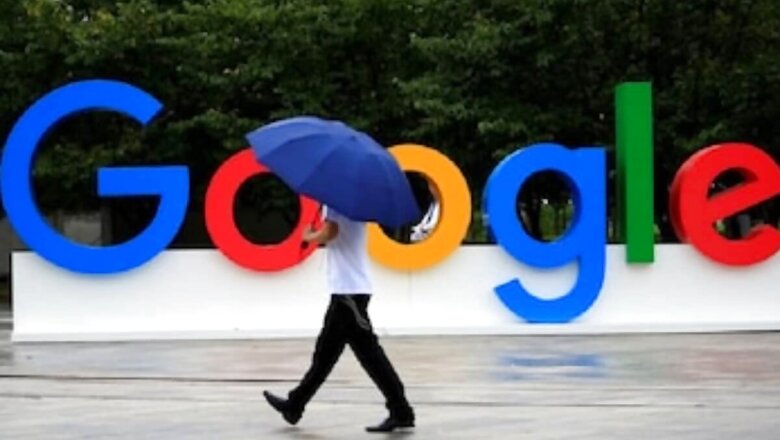
views
Google, one of the biggest technology companies in the world, is by now no stranger to antitrust lawsuits. The latest one, however, is the first of its scale that draws significant allegations on a broad scale, and seeks recourse to rein in its powers. Earlier this week, on Wednesday, July 7, attorneys general of 36 states in USA, as well as Washington, DC, filed a lawsuit at the California federal court alleging significant antitrust and monopolistic practices by Google with its Play Store. The latter, as the lawsuit alleges, is being carefully and consciously maintained by Google as the leading app store on Android, and that the company takes careful steps to ensure that all developers continue to ferry their wares on it – instead of independent and third party app stores elsewhere on the web.
Steps taken to maintain monopoly?
According to the lawsuit, the first and foremost allegation states that Google presently holds a 90 percent market share of all Android apps with its Play Store, despite the Android operating system being “open” (unlike “some others”, as Google reminded in its response). The lawsuit states that Google has taken conscious steps to maintain this Play Store dominance, with actions such as preventing third party app stores from buying Google ads on either Search or YouTube, and also refusing them from being downloaded through the Play Store – which comes preinstalled on every Android phone with Google services, i.e. apart from Huawei’s.
The lawsuit also states that when it comes to a number of developers, Google allegedly paid them to continue using the Play Store. This, the lawsuit alleges, was done to ensure that users keep using the Play Store to have their apps updated, in essence not being able to leave it. According to a Politico report, the lawsuit even alleges that Google tried to pay Samsung to not strike exclusive deals through its own app store, the Galaxy Store. The deal, according to the report, did not materialise.
The basis for the lawsuit is Google’s impending move that would make it compulsory for app developers to share a 30 percent revenue cut with the Android maker, starting September 2021. Google also seeks to more stringently establish that all developers publishing apps on its store must use Google’s own payment instruments, a move that Apple has made long ago (and been criticised for). Notable app makers offering subscription services, such as Spotify, Netflix and more, have so far avoided paying Google a hefty chunk out of their subscription revenues. Subsequent to Google’s new policy enforcement, they’d be forced to.
‘Strange, meritless’: What Google says
In response to the lawsuit, Wilson White, senior director of public policy at Google, underlines that among other things, the case against the company at the federal court is “strange”. As part of his defences against the lawsuit, White states that it is unfair to not count the Apple App Store as one of the Google Play Store’s key rivals, and that the lawsuit does wrong by only counting app stores within the Android ecosystem. The reason, White states, is around how Apple’s app ecosystem is one of the most successful ones in the world, and therefore, “if we’re not providing them (the users) with the best experience on Google Play, they have other alternatives to choose from.”
White further goes on to state that contrary to what the lawsuit claims, Google actually enables competition – he cites the presence of app stores that each OEM preloads with their custom Android interfaces as proof. “Most Android devices ship with two or more app stores preloaded. And popular Android devices such as the Amazon Fire tablet come preloaded with a competitive app store and no Google Play Store,” says White. He also circles the practice of ‘sideloading’ apps on Android – the practice of installing app packages from third party websites. This claim, though, is questionable – given that Google has also parallely pushed the security aspect to actively discourage users from sideloading apps.
Finally, White highlights the amount of revenue the Play Store has generated for small time developers and the number of jobs it has created, before adding, “Android and Google Play provide openness and choice that other platforms simply don’t. This lawsuit isn’t about helping the little guy or protecting consumers. It’s about boosting a handful of major app developers who want the benefits of Google Play without paying for it. Doing so risks raising costs for small developers, impeding their ability to innovate and compete, and making apps across the Android ecosystem less secure for consumers.”
May Google be wronged here?
While the hearing is yet to begin, a few points are important to consider here. In the recent, landmark big tech court battle of Apple vs Epic Games, Apple zeroed in on the security aspect of their mobile operating system, iOS, by throwing both Android and its own macOS under the bus. Apple, however, had a fair amount of data backing them up – iOS does legitimately have fewer security gaffes in comparison to the Play Store’s seemingly relentless malware problems.
Google, on this note, may not have outright banned third party app stores and app downloads, but it also discourages the average user from doing so. While the security implications are not farcical, questions have persisted on whether Google is even doing enough on the security front – or are at a no man’s land here. The second point, on this note, comes to Google’s recent move to switch to Android App Bundle (AAB), a new file format that replaces the long-standing APKs (App Packages).
The move will essentially require small, indie app developers to choose one of the two file formats, since third party app stores can continue using APKs as Android will not officially discontinue support for the latter. Given that smaller developers would not have the resources to maintain two versions of their apps in tandem, they may be indirectly nudged towards choosing the Play Store – since the latter has a significantly larger volume of users. This may also count towards Google’s antitrust woes, in the long run.
As the world awaits the verdict on Apple v Epic, it’s Google v America in round two of big tech’s many challenges. The question, then, is if regulators and lawmakers would have enough ammo to enforce a change in how the erstwhile Android operates.
Read all the Latest News, Breaking News and Coronavirus News here.



















Comments
0 comment